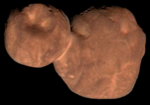2019 TA7
Appearance
| Discovery [1] | |
|---|---|
| Discovered by | MLS |
| Discovery site | Mount Lemon Obs. |
| Discovery date | 9 October 2019 (first observed only) |
| Designations | |
| 2019 TA7 | |
| NEO · Aten [1][2] | |
| Orbital characteristics [2] | |
| Epoch 27 April 2019 (JD 2458600.5) | |
| Uncertainty parameter 7[2] · 8[1] | |
| Observation arc | 4 days |
| Aphelion | 1.0991 AU |
| Perihelion | 0.4140 AU |
| 0.7566 AU | |
| Eccentricity | 0.4528 |
| 240 days | |
| 347.90° | |
| 1° 29m 52.08s / day | |
| Inclination | 4.1480° |
| 13.589° | |
| 158.80° | |
| Earth MOID | 0.0093 AU (3.6 LD) |
| Physical characteristics | |
| 34 m (111 ft) | |
| 19.1 (brightest)[1] | |
| 26.29[2] 26.3[1] | |
2019 TA7 is an Aten (NEO) asteroid, estimated to be about 34 meters (111 feet) in diameter, that was first observed on 9 October 2019, and flew pass the Earth at 38,100 km/h (23,700 mph), about 0.01 AU (1,500,000 km; 930,000 mi) away, its closest encounter in 115 years, on 14 October 2019 at 6:53 pm ET.[1][2][3][4]
Trajectory

See also
References
- ^ a b c d e f "2019 TA7". Minor Planet Center. Retrieved 12 January 2020.
- ^ a b c d e f "JPL Small-Body Database Browser: (2019 TA7)" (2019-10-13 last obs.). Jet Propulsion Laboratory. Retrieved 12 January 2020.
- ^ Monzon, Inigo (13 October 2019). "NASA Asteroid 2019: 111-Foot NEO To Zip Past Earth On Monday". International Business Times. Retrieved 14 October 2019.
- ^ Georgiou, Aristos (15 October 2019). "2019 TA7: this 111 Foot-Wide Asteroid Just Made Its Closest Approach To Earth In 115 Years". Newsweek. Retrieved 15 October 2019.
External links
- 2019 TA7 at NeoDyS-2, Near Earth Objects—Dynamic Site
- 2019 TA7 at ESA–space situational awareness
- 2019 TA7 at the JPL Small-Body Database



